QuestionHello,
My grandmother had a stray living under her house that she would feed. The cat was pregnant and had a litter of kittens. We tried to get the kittens to no avail. Shortly there after all of the kittens were deceased. Fast forward to present time. This same cat was pregnant again but this time we cleaned the mamma up and brought her inside. She had another litter of kittens about 2-3 days ago. However, the mother cat is now very sick and is throwing up and having diarrhea. We are concern for the mother cat and the kittens in this situation. The kittens and the mother are in a safe confined environment without being bothered by the other family pets or small children. Is there something we can do to help this mother cat so she isn't so sick? Is it something that is a threat to her life or is this typical after giving birth? Do we need to give her some kind of meal thats light on her stomach or some type of chicken broth?
Thanks,
John M
AnswerJohn,
Unfortunately this is a medical question and I am not a veterinarian which means that I can't offer diagnoses, treatment recommendations or a prognosis, all of the information that I've provided is based on home remedies that can be administed in addition to whatever treatment your veterinarian recommends. The following suggestions are not meant as a substitute for veterinary care and in my opinion this kitty really needs to see a veterinarian as soon as possible, my recommendation would be to seek the advice of a holistic veterinarian if possible, however I do realize that you may not have a holistic vet in your area. In today's economy not everyone is able to afford the financial costs associated with a sick pet, if you are in need of financial help for this new family's veterinary care I'd be more than happy to help you out in any way that I can. I keep a list of charities and other organizations which may be willing to offer financial assistance that covers part or all of your veterinary expenses, these organizations are located primarily in Canada and the US, although I have found help for folks in many different areas of the world. The only thing that I ask of pet parents who need me to forward names of organizations which may be willing to offer their assistance is that you give me a general idea where you're writing from so that I don't waste your time by providing names of organizations that aren't going to be of help for you since they don't operate in your area and I also have more free time to help more pet parents with their cat related concerns.
I'm concerned that something potentially life threatening could be happening with this kitty, it sounds to me like she's feeling pretty rotten and it's quite possible that she's fairly sick. Some queens will develop slightly softer stool shortly after giving birth, but it's not normal for a queen to be vomiting and having very loose stool after she gives birth to kittens. Queens can experience complications during their pregnancy, while they're delivering their kittens and after they've given birth just like human mothers can. The main difference between a mother cat experiencing complications during any part of her pregnancy, labor or delivery and a human mother experiencing the same complications is that in general most women in first world countries receive extensive prenatal care that often detects potentially serious complications that could harm the mother or her child while most queens receive little or no prenatal care. The lack of prenatal care in mother cats can lead to serious complications at any point in the queen's pregnancy, labor/delivery and in the immediate time after she's delivered her kittens. In some cases pregnancy related complications can be fatal for mom, her kittens or the entire family which means that it's important to take any signs of illness during pregnancy or after delivery very seriously.
Based on your short description of mom's symptoms I'm more than a little concerned that there may be some more serious underlying condition happening with this cat and I really do think that it's worth a trip to the veterinarian. Mom became pregnant under less than ideal circumstances and she's presently under a significant amount of stress at the moment for a number of reasons.
- Mom has clearly spent some time as a stray surviving on handouts from kind people like you and your grandmother
- Her life has recently changed significantly, rather than being left outside to fend for herself she's been brought inside to a completely different environment. Cats are creatures of habit by nature, they do best when their lives are predictable and they can count on routines.
- This queen has recently given birth which is stressful on any new mom's body regardless of the species.
- Mom is currently nursing newborn kittens, which at this early stage in their lives means that if her kittens are healthy mom is nursing throughout much of the day with very few breaks in between because kittens at 2-3 days old spend all of their time doing two things - eating or sleeping.
- This little stray started vomiting at some point shortly after giving birth (I'm not sure how long she's been doing this since you didn't provide that information in your initial question, but the longer it's been going on the more urgently this new mom needs medical care). When a queen has given birth and is nursing newborn kitten she needs to take in 2-4 times the amount of food that she normally did before becoming pregnant in order to meet the nutritional needs of her rapidly growing family without having her body sacrifice its reserves in order to ensure the survival of her kittens. The fact that mom is vomiting at a time when she needs so many calories in order to remain healthy and raise healthy kittens is troubling.
- Mom has diarrea in addition to vomiting which makes the situation even worse because she really may not be able to keep enough fluid and nutrition in her system to maintain her own health.
With all of these contributing factors based on the information that you've provided for me to work with I'm exceptionally concerned about this little family's future. I suspect that mom is quite dehydrated and that's potentially life threatening for her and the newborn kittens. I really think that it's best for mom to be taken to the nearest vet immediately or as close to it as possible, especially if mom's been having diarrea and she's been vomiting for more than 12 hours. In addition to treating mom (and possibly her newborn kittens) for dehydration by administering subcutaneous (under the skin, which isn't all that uncomfortable for cats since they have fairly loose skin) or IV fluids your vet needs to determine what's causing mom to vomit and have diarrea if the physical exam doesn't reveal any obvious abnormality. Based on the fact that this queen has recently given birth to a litter of kittens it's reasonable for your veterinarian to take an x-ray (it's safe to x-ray kittens in the womb) to determine whether or not there are any kittens who haven't been born yet for one reason or another. If the x-ray reveals unborn kittens the veterinarian will most likely stabilize mom as much as possible and perform a caesarian to remove the kittens (which would probably be deceased at this point) and any placentas that may have remained in the uterus (each kitten has his/her own placenta so the number of placentas should match the number of kittens). If your vet does have to perform a caesarian on this mom I'd strongly suggest that she be spayed at the same time to prevent further pregnancies, especially since she's had a rough time with the two pregnancies that you're aware of. If the vet can't find any kittens after mom's been x-rayed s/he may want to perform an ultrasound just to be absolutely sure that no placentas have been left behind in the queen's uterus because retained placentas can cause health problems for mom. Your queen may have a condition called Acute Metritis which sometimes happens after a mother cat gives birth. Acute Metritis means that the lining of the queen's womb is inflamed, this is often related to a bacterial infection caused by unsanitary conditions or retained kittens or placentas. Since we know that mom has been receiving good care in a sanitary environment it's quite possible that she hasn't been able to deliver all of her kittens or placentas for one reason or another which would cause an infection in her uterine lining. A queen with Acute Metritis can have a number of different symptoms and I've taken the opportunity to list them and provide explanations.
- Lethargy: Mom may be less alert than usual, this includes sleeping more frequently or more soundly than she normally would. If you have difficulty rousing mom when she's sleeping that's a serious sign that something isn't right. It's not uncommon for a lethargic cat to be less willing to move around than they normally would.
- Vomiting: While this symptom explains itself there are a few things to keep in mind, your vet will want to know what mom is throwing up, how frequently she's vomiting and anything odd about the vomit because this information can help the doctor to determine what's happening with a cat. It's extremely concerning if mom isn't able to keep down most or any of the food or water she's ingesting. Another potential concern is vomit that's an odd color when you consider what the cat's eating and drinking. If mom's throwing up foam of any color that should be brought to the attention of your veterinarian.
- Diarrhea: In some cases a queen that's recently given birth will have slightly softer stool than she normally would have, but her stool should still be formed. It's not normal for mom to have liquid stool that's the consistency of water or close to it, it's also important to let your vet know if your queen is having extremely soft stool that's thicker than liquid, but still doesn't hold its shape. If mom's stool is softer than usual it's okay so long as she's still having formed stool that holds the usual shape.
- Anorexia: Most folks are familiar with the term anorexia being used to describe an eating disorder characterized by refusing to eat at all or restricting calories consumed in a drastically unhealthy way. When the term anorexia is used in veterinary medicine it simply refers to a complete loss of appetite. Even if mom's still eating the fact that she's vomiting and has diarrea is concerning. I'm guessing that mom feels pretty rotten at this point and she may even be moderately or severely dehydrated. A simple way to test mom's hydration at home is to gently pull the skin at the scruff of her neck up without lifting her off of the ground. If mom's skin immediately snaps back into place she may not be seriously dehydrated yet, however if she's allowed to continue with the vomiting and diarrea for much longer she will become dehydrated which could prove fatal to this new mother and her newborns. If this queen's skin sits on her back in a roll, returns to normal very slowly or remains in the same position that it was when you pinched the skin this is a good indication that mom is dehydrated and needs lifesaving medical care immediately or as soon as humanly possible. It's fairly normal for a queen's appetite to increase significantly after she gives birth since she's now providing nourishment for each of her rapidly growing kittens. I'd be very concerned if mom's not eating at least what she was in the last weeks of her pregnancy because her nutritional requirements are significantly increased since she's now nursing a litter of kittens. In the event that mom isn't getting the nutrients she needs to feed her babies from her diet her health could suffer because nature provides for the survival of the babies which means that her body will steal nutrients from itself in order to keep producing milk for the kittens.
- Fever: Taking a cat's temperature should be done rectally since this offers the most accurate reading. A healthy cat's normal body temperature falls between 100.5 - 102.5 degrees Farenheit. If your cat's temperature is 103 degrees Farenheit or higher she has a fever and she should see a veterinarian promptly. If mom is seriously ill and going into shock you may find that her body temperature is low. Anything 100 degress Farenheit or lower is serious cause for concern and an indication that mom needs immediate medical attention if she's to survive. It's extremely important that you DO NOT under any circumstances give this cat any drugs commonly used in children or adults to reduce a fever. Medications like Tylenol, Advil and many other over the counter medications are extremely toxic to cats even in minute doses. Unless a licensed veterinarian tells you that it's okay to give any cat an over the counter product meant for human use it's best not to take chances. I've taken the liberty of including information about how to take your cat's temperature safely.
1) The family pets should have their own thermometer, it's best not to take a cat's temperature with a thermometer that human family members are using. There are two types of thermometers that work well in my experience. You could use a standard digital thermometer designed for either oral or rectal use that provides readings as quickly as possible in Celcius or Farenheit. There are thermometers specifically designed to take a human baby's rectal temperature, these thermometers have a great safety feature, the actual probe of the thermometer is significantly shorter than a standard thermometer at roughly 1 - 1 1/2 inches long. If memory serves me these thermometers also provide the temperature reading more quickly than a standard thermometer which is especially useful if you aren't accustomed to taking a pet's temperature because nobody really enjoys having their temperature taken rectally.
2) Regardless of the type of thermometer you use I'd recommend cleaning it thoroughly before the first use and after every use. You can wash the thermometer's probe with antibacterial soap under hot water provided that you avoid getting water or soap further up the thermometer where the screen is or if you have alcohol prep pads which are used to disinfect the skin prior to administering an injection you can use them to disinfect the thermometer after each use. Make absolutely sure that the thermometer is dry after disinfecting it with an alcohol pad to avoid causing discomfort to your kitty. I'm not sure what policies are in your area regarding the sale of medical supplies, in my area it's possible to purchase alcohol prep pads from pharmacies and local medical supply stores quite cheaply so I'd recommend that you make some phone calls and find out about local regulations about the sale of medical supplies. The main advantages of using alcohol prep pads include the fact that you don't actually have to touch any feces that might end up on the thermometer probe and the alcohol pads are completely disposable.
3) If you aren't accustomed to taking a cat's temperature it's better for everyone involved if you have a helper to minimize the risk that your kitty will escape or struggle to the point where she could cause internal damage to her rectum or intestinal tract. Which person actually restrains the kitty while her temperature is being taken really depends on who she's more comfortable with. When restraining a cat less is more, you want to be firm without being heavy handed because you want to minimize the amount of stress that any sick pet experiences. I've provided basic instructions to help explain how to restrain this kitty appropriately so that her temperature can be taken. In my experience placing the cat on a countertop or table is easiest on the people taking the cat's temperature since it can take a few minutes to adequately restrain the cat gently and humanely while taking her temperature. The instructions I've provided are written as though the helper is right handed, if your helper is left handed simply switch everything as appropriate. The person restraining the cat will need to use his/her right arm to hold the cat's left side firmly against their body. Once the cat's being held firmly against the helper's body with his right forearm he'll need to use the inside of his elbow to prevent the cat from moving backwards into the thermometer and gently use his right hand to hold onto the area under the cat's chin. The object is to use a minimal amount of force when restraining this kitty for a couple of reasons, first of all a cat who is being held very tightly is more likely to fight to get away and this little girl is already significantly stressed out. For added security the person restraining the kitty can use his left hand to gently get ahold of the cat's scruff (the fur between the shoulder blades) which will most likely reduce the likelihood that she'll try to get away. Finally you're ready to take the cat's temperature, before doing so it's important to lubricate the thermometer's probe with KY jelly or vaseline to minimize the cat's discomfort. You'll only need to insert the thermometer about an inch into the cat's rectum, some resistance is normal, cats do not like having their temperature taken rectally.
- Dark colored, foul smelling vaginal discharge: Your queen may have some vaginal discharge, but if she does it shouldn't smell foul and there shouldn't be very much at all. If your kitty does have foul smelling discharge that's a pretty good indicator that she may have an infection that may be related to giving birth recently.
According to the information you've provided mom is vomiting, she has diarrea and I'd guess that she's not eating particularly well since vomiting and diarrea tend to make anyone feel pretty rotten. When you do take this little girl to the veterinarian to be assessed it's important to bring her newborn kittens along to minimize the chance that mom will reject them. If mom does reject them or the vet feels that mom isn't healthy enough to be nursing her litter then it's possible you'll have to hand raise the kittens. Bottle rearing newborn kittens is time and labor intensive, most kittens will need to be fed every 1 1/2 - 2 hours, 24 hours/day, 7 days/week until they're 4 weeks old and you can introduce solid foods. The weaning process with bottle babies is often difficult and many kittens develop self soothing behaviors that are somewhat equivalent to a child sucking his/her thumb. Orphaned kittens may develop a habit of sucking on finger tips, ear lobes, lips, clothing, blankets, other pets within the household, their littermates or even their own fur. While these behaviors may seem adorable to potential pet parents when a tiny kitten does them most people really don't appreciate these behaviors from a fully grown cat and the obsessive need to nurse on someone or something doesn't just disappear because the kitten grows up. My eldest cat was a rescue, she came into my life when she was only 7 days old and she's 10 now - she still sucks on tufts of fur on her belly and I haven't been able to completely stop her from doing so. In the event that you need information about hand raising orphaned kittens I'd be more than happy to fill you in on the basics of bottle rearing newborn kittens.
You may find that gently rubbing the following Bach flower essences into the relatively fur free skin on mom's ear flaps will help her to cope with her illness. Bach flower essences are gentle, effective and safe homeopathic remedies that I've used in my household to treat various issues in many cats and in my experience they're well worth trying. The beautiful thing about homeopathy is that if you administer the wrong remedy the worst that will happen is absolutely nothing which can't be said about conventional allopathic medicine. You can use Mimulus which is helpful to alleviate anxiety related to specific issues including illness. Olive will help to increase this new mom's energy levels and Gorse will help to alleviate depression caused by this little girl's health issues. If you are able to seek the advice of a holistic vet that practices homeopathy s/he may want to recommend different remedies specific to this kitty's condition.
Other diagnostic tests which your vet may need to be perform include a full pre-anesthetic profile, BUN/Creatinine levels (kidney values), CBC (complete blood count) and a blood chemistry panel. These blood tests will provide your vet with a picture of how this cat's major organ systems are functioning. It's quite possible that whatever is causing her to be so sick will show up in these blood tests and dehydration will also show up. If your kitty is dehydrated enough the vet will need to keep her and the kittens for observation and fluid therapy in the form of IV/subcutaneous fluids for mom and if the kittens are dehydrated the vet may also administer subcutaneous fluids to each baby to ensure that they're well hydrated. If mom wasn't nursing and she was frequently having diarrea and vomiting the vet might recommend withholding food for a few hours to give this little one's belly a chance to settle down, but I'm not sure that's a good idea since mom's nursing newborns. If mom isn't drinking much water then it's important to do what's necessary to get her drinking again. I wouldn't recommend changing mom's diet to include chicken broth as a primary part of her nutritional intake, it may get this baby drinking a little more so I'd suggest speaking with a vet before giving this mom any chiken broth, but if the vet says it's okay and mom's willing to accept the chicken broth then I'd suggest using homemade low sodium chicken broth, right now it's all about making sure that dehydration doesn't claim the mom's life or the lives of her kittens and since she's having some diarrhea and vomiting. If you have any questions, concerns or you'd like me to clarify any part of this answer I'd be more than happy to help you out to the best of my ability. Please feel free to send updates my way so that I know how this new mom and her babies are doing, right now they're all in my thoughts and prayers.

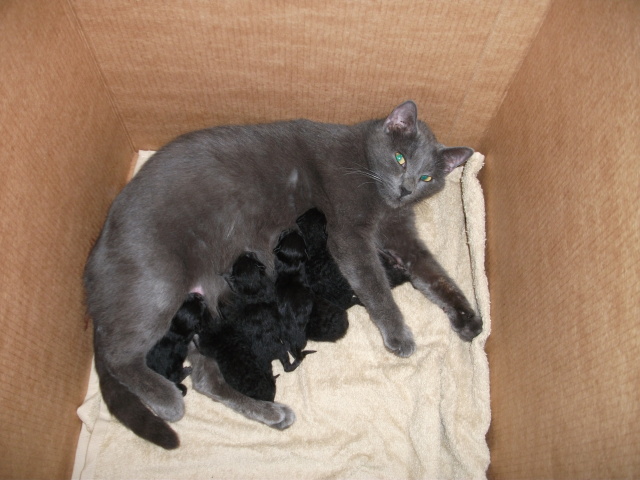 Litter of 9 kittens, born 2/05/10
Question
Smoke and babies
Although we have had 2 adult
Litter of 9 kittens, born 2/05/10
Question
Smoke and babies
Although we have had 2 adult
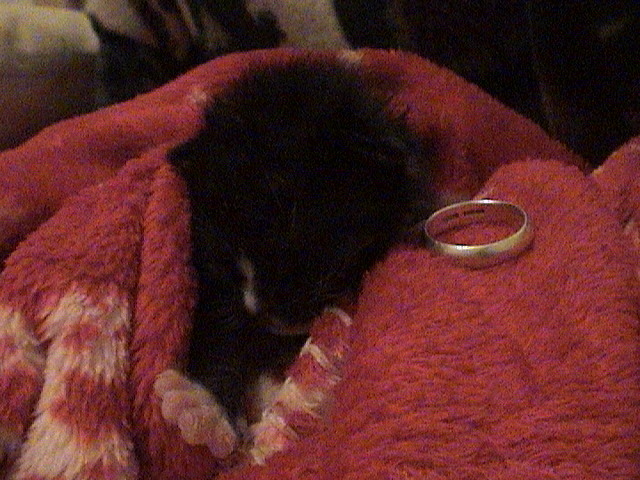 Orphaned Kitten
QuestionQUESTION: My partner and l are very much animal
Orphaned Kitten
QuestionQUESTION: My partner and l are very much animal
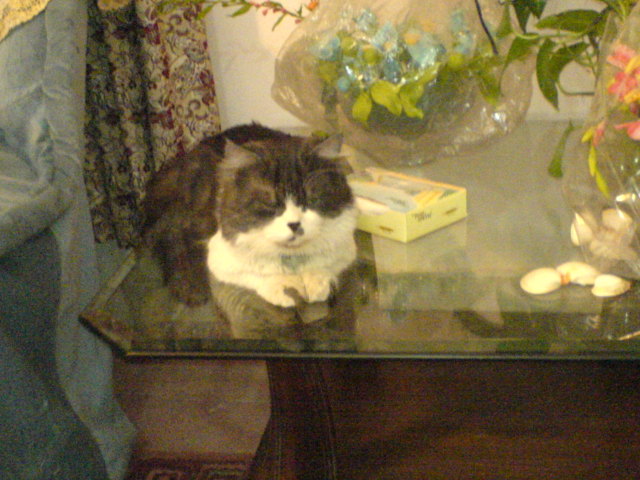 Persian Male Behavioral Issues.
Question
Jimmy
Dear Karen
Hope you are fine. I
Persian Male Behavioral Issues.
Question
Jimmy
Dear Karen
Hope you are fine. I
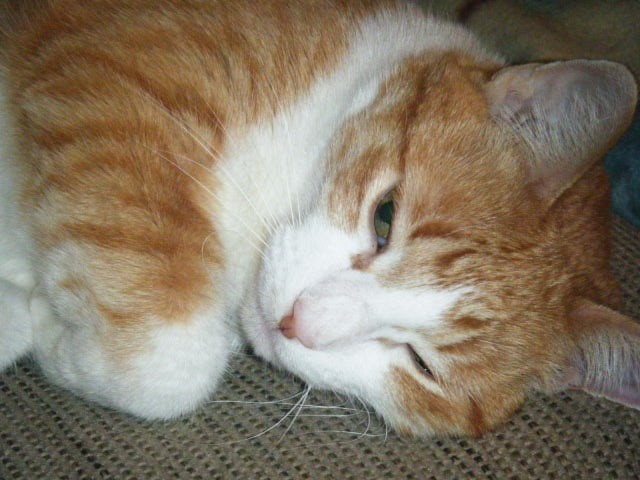 blackened area under lower jaw
Question
Daisy
My Daisy is a 12 year old short-h
blackened area under lower jaw
Question
Daisy
My Daisy is a 12 year old short-h
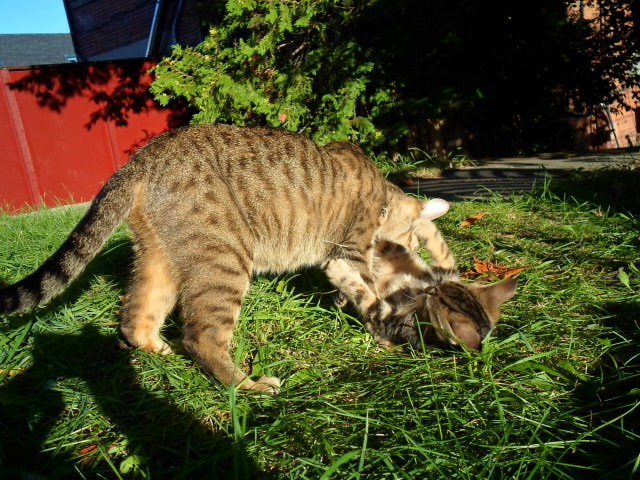 Cat Breed Identification?
Question
Playtime Pretty Girl
Hi there. &n
Cat Breed Identification?
Question
Playtime Pretty Girl
Hi there. &n